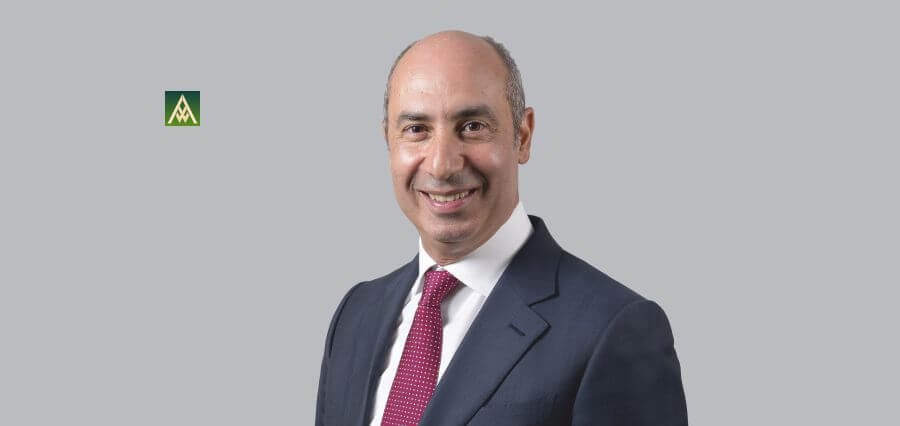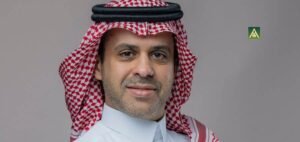“Technology is not only a fast-moving speed train, but also the catalyst for transformation,” says Hossam Seifeldin. For him the interplay between technology, business, and society has been a lifelong fascination. From algorithms streamlining supply chains to AI insights shaping critical decisions, he has witnessed firsthand how technology fuels efficiency and growth across industries. It’s an interconnection that sparked his pursuit of an engineering degree early on.
Seifeldin’s first job out of university was at IBM, a company renowned for its culture of continuous learning and innovation. It was the ideal environment for his curiosities about technological development and digital disruption to take shape. Over the next 27 years, Seifeldin served in various senior managerial positions spanning the Middle East, Africa, and Pakistan regions.
A significant portion of those years were spent working and engaging with diverse cultures in the UAE. As Seifeldin eventually contemplated returning to his home country of Egypt, a unique opportunity at Capgemini presented itself. He was entrusted with establishing a new Global Delivery Center in the nation’s capital.
For Seifeldin, it was a pivotal crossroads where his accumulated knowledge, operational expertise, and steadfast passion for innovation converged. Capgemini represented an ideal environment to continue driving that impact.
In his current role as CEO of Capgemini Egypt, Seifeldin leverages those core experiences to cultivate a culture of curiosity, learning, and harnessing technology’s ability to create meaningful change. Under his leadership, the Global Delivery Center has rapidly emerged as a powerhouse for delivering world-class solutions and services to clients worldwide.
The Evolution of Capgemini
Capgemini, the global leader in consulting, digital transformation, technology, and engineering services, was founded by Serge Kampf in Grenoble, France, in 1967. The company, initially called Sogeti, rapidly expanded and, in 1974, with the acquisition of Cap and Gemini Computer Systems, became one of the largest European IT systems companies. In 1975, the group diversified into consulting and outsourcing, 20 years ahead of its competitors.
Two years later, with nearly 2,000 employees, Capgemini entered the US market. In 1985, the group was floated on the Paris Stock Exchange, and the share price increased by 25% in five months. Serge Kampf later established the group’s headquarters at the prestigious Place de l’Etoile in Paris. The group adopted a single name and logo for all its activities, “Capgemini,” in 1996. By the year 2000, Capgemini confirmed its global ambitions by acquiring Ernst & Young Consulting.
Today, Capgemini is a diverse collective of 340,000 strategic and technological experts across more than 50 countries. The company is driven by a shared passion: to unleash human energy through technology. At Capgemini, values and ethics are at the heart of its identity. The company believes in honesty, boldness, trust, freedom, fun, modesty, and team spirit.
Building a Global Delivery Centre
Seifeldin’s vision for Capgemini’s Global Delivery Centre in Egypt has come to fruition, showcasing the effectiveness of strategic planning. Initially, the centre had around 40 employees working in a single business line, Business Process Outsourcing, serving a single customer. Today, the workforce has more than tripled, and the offerings have diversified into four distinct business lines serving 26 customers worldwide.
The strategic approach was built on two key pillars. Firstly, Seifeldin focused on establishing a strong brand identity and amplifying the compelling brand promise. This brand identity serves as a powerful magnet, attracting top talent from Egypt’s competitive market. By emphasizing how working for the organization could rewrite the future for employees, the brand promise became even more compelling and impactful in attracting top talent.
Secondly, cultivating a robust organizational culture was crucial. This began with assembling a strong leadership team. The goal was to create a culture that not only retained employees but also aligned with Capgemini’s core values. By acknowledging values that resonate with the company, the aim was to foster an environment where everyone thrives.
Capgemini’s Strategic Expansion
Capgemini’s decision to establish a new Global Delivery Centre in Egypt was a carefully considered and strategic move, allowing the company to tap into emerging talent pools. However, this significant undertaking came with its own set of unique challenges.
Understanding the dynamics and trends of the Egyptian talent market was crucial, given its highly competitive nature. Since the GDC serves clients globally, it was essential to comprehend and adapt to these differences to effectively collaborate with customers. Building a robust local network with relevant stakeholders was also critical, as was navigating the complex legal and regulatory landscape. Furthermore, launching the center during a period of economic uncertainty required managing fluctuations in currency exchange rates, which posed significant challenges.
Unique Value Proposition
Seifeldin highlights the distinct benefits that Egypt’s market and talent pool bring to Capgemini’s Global Delivery Center. These advantages include:
- Diverse Talent Pool: Egypt boasts a large and diverse talent pool with a strong educational background, particularly in IT and engineering.
- Strategic Location: Egypt’s strategic location at the crossroads of Africa, Asia, and Europe makes it an ideal hub for serving clients across various time zones.
- Cost Efficiency: The relatively lower cost of living and labor in Egypt can lead to significant cost savings for the company.
- Multilingual Capabilities: Many Egyptians are multilingual, proficient in Arabic, English, and often French and German, which is a considerable asset in serving a global clientele.
- Growing Tech Ecosystem: Egypt has a rapidly growing tech ecosystem, with increasing investments in tech startups and digital transformation initiatives, fostering a conducive environment for innovation and digital service delivery.
To leverage these advantages, Capgemini employs various strategies. These include forming partnerships with educational institutions, investing in training and development programs to continuously upskill the workforce, and keeping them informed about the latest technologies and industry trends.
Additionally, Capgemini fosters innovation by leveraging local expertise and creating an environment that rewards creativity and problem-solving. As part of this effort, the company has recently graduated its first wave of young professionals—fresh graduates who have undergone nine months of training and will have full-time employment contracts.
Cultivating Enduring Partnerships in the EMEA Region
Seifeldin outlines several key factors that contribute to building strong partnerships with clients in the EMEA region. Firstly, showcasing Capgemini’s ability to provide agnostic tailored services efficiently is paramount, as it establishes trust and confidence by demonstrating flexibility and expertise in meeting the unique needs of each client.
Secondly, Capgemini’s diverse services across various industries play a crucial role. Serving a wide range of global clients, from automotive and aerospace to telecommunications and consumer products and hospitality, underscores the company’s adaptability and proficiency.
Lastly, Capgemini’s state-of-the-art Global Delivery Centre (GDC) further enhances the ability to ensure long-term collaboration and satisfaction. Operating 24/7 and offering services in multiple languages, the GDC caters to clients globally, ensuring seamless support and efficient delivery.
By tailoring services, leveraging diverse industry expertise, and leveraging state-of-the-art delivery capabilities, Capgemini ensures that partnerships with clients in the EMEA region are built on excellence and positioned for long-term success.
Commitment to Continuous Learning
Capgemini, a leading global technology and consulting firm, firmly believes in the power of continuous learning and development for its employees. The company recognizes that staying ahead of the curve in a rapidly evolving industry requires a workforce that is constantly updated on the latest trends and innovations.
To this end, Capgemini has implemented a comprehensive learning program that is seamlessly integrated into the daily work culture. The program offers tailored learning experiences to meet the individual needs of its employees, ensuring that they have access to the tools, technologies, and industry insights necessary to excel in their roles.
The company’s “Next” digital learning platform, developed in collaboration with leading content providers such as Pluralsight, Harvard Manage Mentor, and Coursera, provides employees with a vast array of courses and certifications. This platform encompasses over 250,000 courses and 3 million learning activities, catering to a wide range of interests and skill levels.
Furthermore, Capgemini leverages the expertise of its dedicated research centers, which are part of the Capgemini Research Institute. This institute has consistently earned top rankings (#1) for the quality of its research, ensuring that the insights it provides are actionable and drive innovation and industry competitiveness.
Holistic Approach
Seifeldin recognizes that the sustainability challenges facing our planet and organizations today serve as a unifying call to action for all humanity. The company’s drive to create value for customers, partners, and employees is deeply rooted in acknowledging these pressing issues. They are committed to making a meaningful contribution towards addressing these concerns and developing innovative solutions.
Envisioning the Future of Technology Services
Drawing on extensive experience at IBM and now at Capgemini, Hossam Seifeldin foresees the future of technology services evolving in exciting directions. He notes that organizations must leverage innovative technologies to stay ahead of competitors and capitalize on opportunities. Key technologies shaping this future include the metaverse, blockchain, AI, quantum technologies, and Generative AI.
Capgemini’s TechnoVision 2024 framework provides valuable insights into the future of technology, highlighting five prominent megatrends:
- Generative AI: Recognized globally as a transformative force in business strategies.
- Quantum Technology: Poised for breakthroughs that are critical for maintaining competitiveness.
- Semiconductor Advancements: Influencing computing capabilities and innovation.
- Innovations in Battery Technology: Impacting sectors from electric vehicles to renewable energy.
- SpaceTech: Offering unique solutions to global challenges from beyond Earth.
Seifeldin underscores the importance of deploying these innovations accurately, safely, ethically, and sustainably. Capgemini leads the charge in shaping the future of services, aiming not only to create value for clients but also to make positive contributions to society and the environment.




